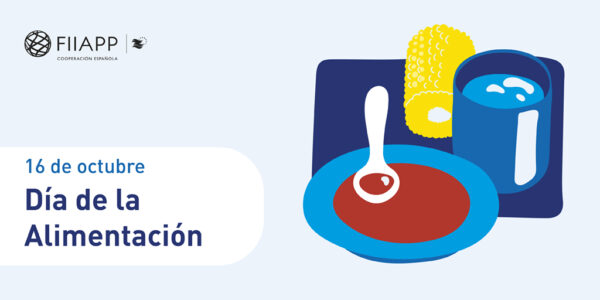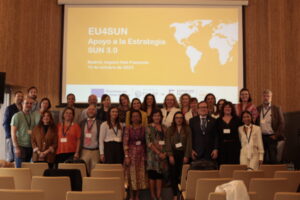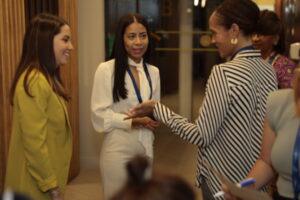-
16 October 2023
Category : Sin categorizar
The human right to food to leave no one behind
One of the basic - and fundamental - human needs is the right to satisfy hunger. The right to food entails multiple actions and requires the existence of conditions and factors that make it possible to obtain food

Wars, occupations, plunder, robbery and domination have developed around the need to eat. The right to food is much more than being fed, it is the right to be fed in dignity and in an adequate manner that provides all the nutritional components a person needs to live a healthy and active life, as well as the means to access them. Undoubtedly, the entrenched socio-political factors of nutritional inequalities and their relationship to power imbalances need to be addressed if no one is to be left behind.
In this sense, the challenge of eradicating hunger and food insecurity in the world needs a universal agenda and country- and context-specific strategies, necessarily taking into consideration a people-centred and human rights-based approach. This requires concerted efforts that translate into political commitments to ensure the real implementation of ad hoc policies and programmes, as well as the mobilisation of sufficient resources to achieve a global guarantee of the human right to adequate food and the transformation of agri-food systems to provide healthy diets for all.

Launch in Madrid of the European project on food and nutrition policies in 8 Latin American and 7 West African countries, on 11 October. Malnutrition and poverty – a vicious cycle
While healthy diets are a cornerstone of good nutrition, it is important to recognise that there are many other determinants of nutritional status that are often associated with multidimensional poverty, such as universal access to health, safe water, sanitation, education, social protection, gender equality and women’s empowerment, requiring greater attention to preventive approaches across sectors.
For example, women and adolescent girls are particularly prone to poor diets and malnutrition due to their increased nutritional needs (e.g., during menstruation, pregnancy or breastfeeding) and factors such as social norms and gender inequality.
Investments to reduce malnutrition in women are important not only for their own health, but also for the health and nutrition of their children, given the relationship between maternal and child nutritional status. The vicious cycle of poverty and malnutrition is perpetuated throughout the life cycle and across generations, as low-birth-weight babies become stunted children and grow into undernourished adolescents and adults, with physical, cognitive and economic implications.
Challenges and interconnected solutions
All of the world’s challenges are interconnected, and so are their solutions. By promoting sustainable agrifood systems around the world, we reduce the number of poor and hungry people, help combat climate change and preserve natural resources for future generations. With less than 10 years to go to reach the Sustainable Development Goals (SDGs) deadline, we aim to accelerate the pace of progress through four pathways:
- Leverage investments to combat climate change and strengthen food systems.
Reduce poverty and improve food and nutrition security for healthier households, communities and food environments.
Address the causes of food crises and build community resilience.
Promote sustainable agricultural practices that protect biodiversity and build on nature-based solutions.
The FIIAPP committed to Food and Nutrition Security
At FIIAPP, we are working in the Food and Nutrition Security (FNS) sector from a systemic, multilevel and multi-stakeholder participatory approach to address the economic, social and environmental dimensions of the right to food. We do this through the European project EU4SUN, which is part of the European Union’s support programme for the implementation of the Scaling Up Nutrition (SUN) 3.0 strategy.

EU4SUN project coordinator, Alba Rodríguez (c), during the launch of the project. With EU4SUN we seek to encourage and facilitate dialogues that contribute to human-centred social and institutional transformation and a just and green transition. How do we do this? By mobilising the public expertise of our administrations to develop Food and Nutrition Security policies in Latin America, the Caribbean and West Africa. Find out here all the details of the launch of the project on 11 October in Madrid.
EU4SUN accompanies and strengthens strategic partnerships with the SUN movement to advance more dynamic governance. We support, on a demand-driven basis, partner countries’ efforts to combat hunger and malnutrition in all its forms through technical assistance, peer-to-peer exchanges, dialogue and advocacy.
We join the FAO Strategic Framework which in turn supports the 2030 Agenda, and support the operationalisation of the efforts of the EU Nutrition Action Plan: better production, better nutrition, better environment and better lives, leaving no one behind.
Alba Rodríguez, coordinator of the European project led by FIIAPP, together with Expertise France, against hunger and malnutrition in Latin America and Africa: EU4SUN.
The views and opinions expressed in this blog are the sole responsibility of the person who write them.
- Leverage investments to combat climate change and strengthen food systems.






